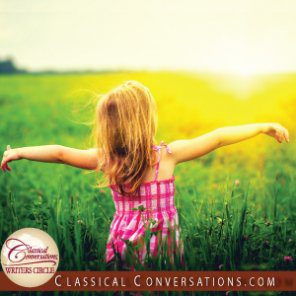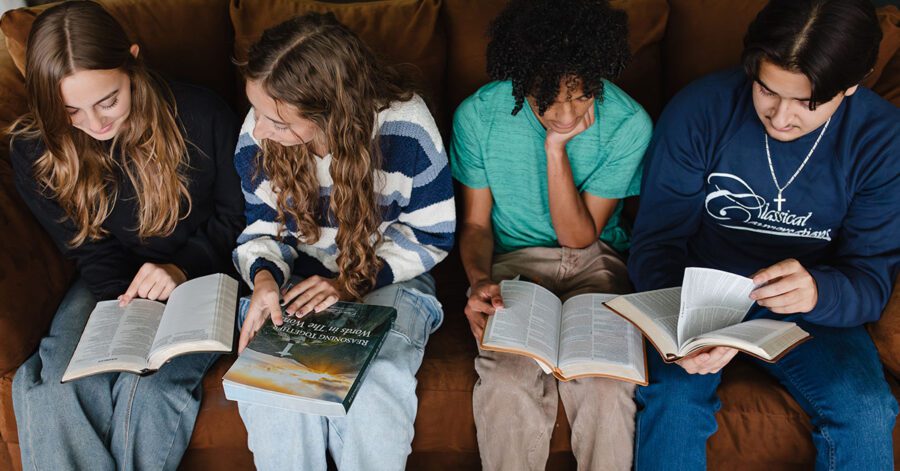A nice long summer is spreading out before us, and I am remembering the words of Anne of Green Gables. “Ah, summer! Two months of glorious freedom!” she exclaimed on her walk home from the last class of the school year.
As a homeschool mom with two months of “glorious freedom” before me, I imagine all the fantastic learning opportunities we could have. We could learn Greek! Or work in an extra biology course! Or start the fancy curriculum I saw at the homeschool convention!
A big project, though, often crashes and burns when I realize my kids are kids and they need some rest time. They aren’t machines into which I just cram subjects. I’ve realized that rest is important, and taking time to nurture their souls is very important. Subjects will be covered thoroughly enough during our Classical Conversations year so our focus during summer is nurturing their souls in other areas. That could mean anything from camping trips to service projects or physical training.
I do continue a little academic work at a slow and steady pace when we’re home. I don’t know if you call Bible reading ‘academic’—or just life—but every day we read from the Bible. Leigh says the Bible is meant to be read aloud together, and this is certainly worth trying. If you find it intimidating to read the Bible to your children without a curriculum guide, here are some tips to get you started: Don’t approach it as if you were a preacher. You don’t need to prepare a long speech about what you read. Just read it aloud and ask your kids three questions: 1) Who was that about? 2) What did they do? 3) What can we learn from this? Just ask those three questions and listen to what they say. Keep it simple.
‘Type A’ homeschool parents can feel good about this because you’ll be teaching the grammar of the Bible: the stories, names, places, and events; the children will be practicing listening skills; they will be identifying characters, plots, and themes in literature; and they will be practicing communication skills. Plus, the third question may lead your conversations with your children into some real understanding and wisdom.
The other thing that Leigh encourages is a little math every day even in the summer. Make it a part of the morning routine. Make up your bed, brush your teeth, do a math sheet. This might be a hard sell at first. I had to ease my kids into this idea by making math drills into games at first. Eventually, I said, “You know we could just do a math sheet instead of a game and get outside sooner.” They agreed to that and a habit was born. I don’t choose more advanced lessons in the summer simply to get ahead. I buy something on the same grade level so that we’re primarily reviewing—this makes the work easy and allows the kids to work independently.
The other thing that I love about summer is the extra time for reading great books. If you haven’t read A Thomas Jefferson Education, put that first on your summer reading list. It is an inspiring book, and the take home message for summer is: read a lot of good books—that makes a great education.
I think about each child and what I’d like him or her to learn over the summer, and then I choose books according to each child’s needs and interests. I let them read independently, I read to them, and their dad reads aloud at bedtime.
Some of my favorite books for summer are: Little House on the Prairie, Little Britches, Anne of Green Gables, Laddie, Lord of the Rings, or anything from the book lists at Beautiful Feet or Veritas Press.
Did you know there are great books about math? Two that come to mind are: A Place for Zero, What’s Your Angle, Pythagoras? and Sir Cumference and the First Round Table. These are short picture books, and they can be read aloud to younger children, or enjoyed by older children who read on their own. Starting about fifth grade, we read Life of Fred books in the summer. These books will make you laugh and will demonstrate the integration of subjects: Can you learn biology during a math lesson? Yes, you can! For advanced math read Journey to the Center of the Earth and try some of the math described there.
Summer is also a great time to watch educational DVDs. Some resourceful parents might go in together and share the cost of DVDs and watch them together. You’ll be social, frugal, and educational at the same time! High school students might want to do Economics in a Box or The Truth Project with friends. Younger students might enjoy watching Latin, science, or even math DVDs with their friends.
We also “carschool” in the summer; we love to listen to CDs on car trips. We listen to The Story of the World, Lyrical Life Science, Beethoven’s Wig, and Jim Weiss recordings of literature and history stories. Your library may also have books on CD. Listening to a book in the car really makes the time go by and the whole family can enjoy it together.
My Greek textbook will stay on the shelf this summer and we will probably not complete any formal curriculum, but I will try to nurture my children’s souls, love the Lord together, live adventures vicariously through our books, and enjoy our “two glorious months of freedom.”




